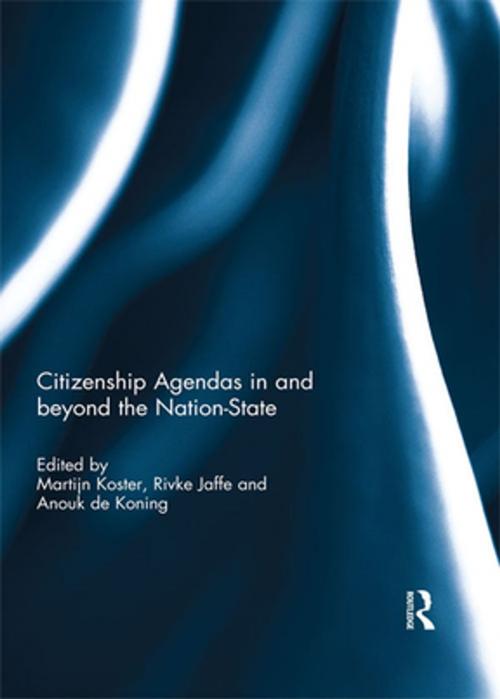Citizenship Agendas in and beyond the Nation-State
Nonfiction, Social & Cultural Studies, Political Science, Politics, City Planning & Urban Development, Government, Civics| Author: | ISBN: | 9781315453279 | |
| Publisher: | Taylor and Francis | Publication: | April 19, 2018 |
| Imprint: | Routledge | Language: | English |
| Author: | |
| ISBN: | 9781315453279 |
| Publisher: | Taylor and Francis |
| Publication: | April 19, 2018 |
| Imprint: | Routledge |
| Language: | English |
In today’s world, citizenship is increasingly defined in normative terms. Political belonging comes to be equated with specific norms, values and appropriate behaviour, with distinctions made between virtuous, desirable citizens and deviant, undesirable ones. In this book, we analyze the formulation, implementation, and contestation of such normative framings of citizenship, which we term ‘citizenship agendas’. Some of these agendas are part and parcel of the working of the nation-state. Other citizenship agendas, however, are produced beyond the nation-state. The chapters in this book study various sites where the meaning of ‘the good citizen’ is framed and negotiated in different ways by state and non-state actors. We explore how multiple normative framings of citizenship may coexist in apparent harmony, or merge, or clash. The different chapters in this book engage with citizenship agendas in a range of contexts, from security policies and social housing in Dutch cities to state-like but extralegal organizations in Jamaica and Guatemala, and from the regulation of the Muslim call to prayer in the US Midwest to post-conflict reconstruction in Lebanon. This book was previously published as a special issue of Citizenship Studies.
In today’s world, citizenship is increasingly defined in normative terms. Political belonging comes to be equated with specific norms, values and appropriate behaviour, with distinctions made between virtuous, desirable citizens and deviant, undesirable ones. In this book, we analyze the formulation, implementation, and contestation of such normative framings of citizenship, which we term ‘citizenship agendas’. Some of these agendas are part and parcel of the working of the nation-state. Other citizenship agendas, however, are produced beyond the nation-state. The chapters in this book study various sites where the meaning of ‘the good citizen’ is framed and negotiated in different ways by state and non-state actors. We explore how multiple normative framings of citizenship may coexist in apparent harmony, or merge, or clash. The different chapters in this book engage with citizenship agendas in a range of contexts, from security policies and social housing in Dutch cities to state-like but extralegal organizations in Jamaica and Guatemala, and from the regulation of the Muslim call to prayer in the US Midwest to post-conflict reconstruction in Lebanon. This book was previously published as a special issue of Citizenship Studies.















